Connect With Us
Blog
Items filtered by date: May 2023
When You May Need Orthotics
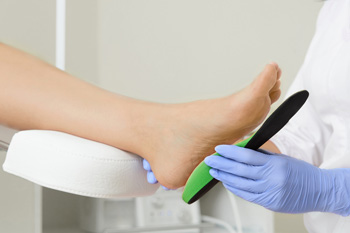
Orthotics are shoe inserts that help redistribute pressure, improve gait and posture, and cushion sensitive parts of the feet. The can also help to absorb shock and reduce foot pain. People with certain conditions that can benefit from orthotics include plantar fasciitis, lower limb injuries, flat feet or high arches. Patients with pronation or supination may also find a better distribution of pressure and equilibrium when orthotics are worn. Most people seem to benefit while some kind of orthotic is worn, either custom-made inserts or those that can be purchased over-the-counter. If you would like to know more about this pain-saving device, it is suggested that you visit a podiatrist to see if you are a good candidate for custom orthotics.
If you are having discomfort in your feet and would like to try orthotics, contact Dr. Howard Horowitz from Bowie Foot & Ankle . Our doctor can provide the care you need to keep you pain-free and on your feet.
What Are Orthotics?
Orthotics are inserts you can place into your shoes to help with a variety of foot problems such as flat feet or foot pain. Orthotics provide relief and comfort for minor foot and heel pain but can’t correct serious biomechanical problems in your feet.
Over-the-Counter Inserts
Orthotics come in a wide variety of over-the-counter inserts that are used to treat foot pain, heel pain, and minor problems. For example, arch supports can be inserted into your shoes to help correct overarched or flat feet, while gel insoles are often used because they provide comfort and relief from foot and heel pain by alleviating pressure.
Prescription Orthotics
If over-the-counter inserts don’t work for you or if you have a more severe foot concern, it is possible to have your podiatrist prescribe custom orthotics. These high-quality inserts are designed to treat problems such as abnormal motion, plantar fasciitis, and severe forms of heel pain. They can even be used to help patients suffering from diabetes by treating foot ulcers and painful calluses and are usually molded to your feet individually, which allows them to provide full support and comfort.
If you are experiencing minor to severe foot or heel pain, it’s recommended to speak with your podiatrist about the possibilities of using orthotics. A podiatrist can determine which type of orthotic is right for you and allow you to take the first steps towards being pain-free.
If you have any questions please contact our office located in Bowie, MD . We offer the newest diagnostic and treatment technologies for all your foot and ankle needs.
How Did I Hurt My Achilles Tendon?
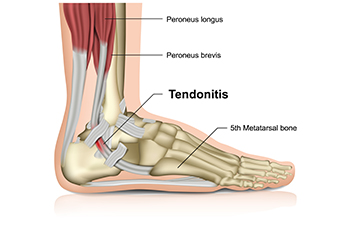
There is no mistaking the discomfort that can happen from enduring an Achilles tendon injury. It is often a sudden, sharp pain that occurs when this tendon becomes torn. It can happen to runners who increase speed and mileage too quickly, often without properly warming up. The Achilles tendon is located in the lower portion of the calf and connects the heel to the calf muscles. This type of injury may also happen while running on hard or uneven surfaces, or if the foot suddenly turns out. In addition to the intense pain this injury can cause, the affected foot may feel stiff in the morning, and is often painful when touched. Treatment often begins by stopping the activity that caused the injury, and a brace or cast may need to temporarily be worn that can provide stability as it heals. If you have had an Achilles tendon injury, it is strongly suggested that you consult with a podiatrist who can guide you toward treatment options that are correct for you.
Achilles tendon injuries need immediate attention to avoid future complications. If you have any concerns, contact Dr. Howard Horowitz of Bowie Foot & Ankle . Our doctor can provide the care you need to keep you pain-free and on your feet.
What Is the Achilles Tendon?
The Achilles tendon is a tendon that connects the lower leg muscles and calf to the heel of the foot. It is the strongest tendon in the human body and is essential for making movement possible. Because this tendon is such an integral part of the body, any injuries to it can create immense difficulties and should immediately be presented to a doctor.
What Are the Symptoms of an Achilles Tendon Injury?
There are various types of injuries that can affect the Achilles tendon. The two most common injuries are Achilles tendinitis and ruptures of the tendon.
Achilles Tendinitis Symptoms
- Inflammation
- Dull to severe pain
- Increased blood flow to the tendon
- Thickening of the tendon
Rupture Symptoms
- Extreme pain and swelling in the foot
- Total immobility
Treatment and Prevention
Achilles tendon injuries are diagnosed by a thorough physical evaluation, which can include an MRI. Treatment involves rest, physical therapy, and in some cases, surgery. However, various preventative measures can be taken to avoid these injuries, such as:
- Thorough stretching of the tendon before and after exercise
- Strengthening exercises like calf raises, squats, leg curls, leg extensions, leg raises, lunges, and leg presses
If you have any questions please feel free to contact our office located in Bowie, MD . We offer the newest diagnostic tools and technology to treat your foot and ankle needs.
The Importance of Daily Foot Care
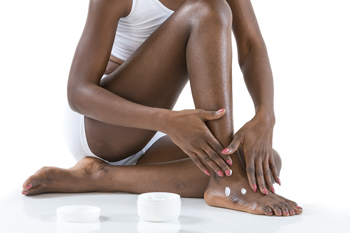
The feet can be a barometer of our health, and like other parts of our bodies, it is important to care for our feet. The feet need to be strong, limber, and stable to perform daily functions, keep us upright, and prevent us from falling. Foot pain is common, yet many of us do not care for our feet as we should. A daily foot routine can go a long way in preventing foot problems. Things to consider doing as part of such a routine include washing, drying, and moisturizing the feet daily, cutting toenails regularly and straight across to prevent ingrown toenails, and wearing shoes that are comfortable and fit well. Examining the feet for brewing issues, such as cuts, growths, or discoloration, is also important. If you would like more information on caring for your feet, it is suggested that you make an appointment with a podiatrist today.
Everyday foot care is very important to prevent infection and other foot ailments. If you need your feet checked, contact Dr. Howard Horowitz from Bowie Foot & Ankle . Our doctor can provide the care you need to keep you pain-free and on your feet.
Everyday Foot Care
Often, people take care of their bodies, face and hair more so than they do for their feet. But the feet are a very important aspect of our bodies, and one that we should pay more attention to. Without our feet, we would not be able to perform most daily tasks.
It is best to check your feet regularly to make sure there are no new bruises or cuts that you may not have noticed before. For dry feet, moisturizer can easily be a remedy and can be applied as often as necessary to the affected areas. Wearing shoes that fit well can also help you maintain good foot health, as well as making it easier to walk and do daily activities without the stress or pain of ill-fitting shoes, high heels, or even flip flops. Wearing clean socks with closed shoes is important to ensure that sweat and bacteria do not accumulate within the shoe. Clean socks help to prevent Athlete’s foot, fungi problems, bad odors, and can absorb sweat.
If you have any questions please feel free to contact our office located in Bowie, MD . We offer the newest diagnostic and treatment technologies for all your foot and ankle needs.
Plantar Wart Growth
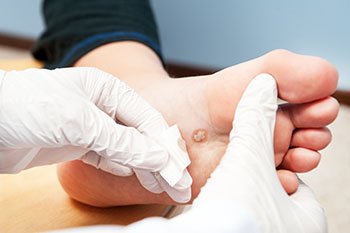
Patients often ask podiatrists how plantar warts grow on the feet. The answer is slightly complicated. These warts can grow and develop on the bottoms or soles of the feet typically from exposure to the human papillomavirus (HPV). Often the HPV can enter the skin through some sort of existing cut or opening. As a result, the HPV can facilitate uncontrolled cellular growth, which ultimately leads to the development of a wart. Plantar warts are unique in that they can create a hole in the bottom of the feet. Some plantar warts can be particularly painful for patients. Other cases of plantar warts might even be itchy. If you are currently suffering from plantar warts, it is suggested that you schedule an appointment with a podiatrist today who can help you address any problems you might have from this infection.
Plantar warts can be very uncomfortable. If you need your feet checked, contact Dr. Howard Horowitz from Bowie Foot & Ankle . Our doctor will assist you with all of your foot and ankle needs.
About Plantar Warts
Plantar warts are the result of HPV, or human papillomavirus, getting into open wounds on the feet. They are mostly found on the heels or balls of the feet.
While plantar warts are generally harmless, those experiencing excessive pain or those suffering from diabetes or a compromised immune system require immediate medical care. Plantar warts are easily diagnosed, usually through scraping off a bit of rough skin or by getting a biopsy.
Symptoms
- Lesions on the bottom of your feet, usually rough and grainy
- Hard or thick callused spots
- Wart seeds, which are small clotted blood vessels that look like little black spots
- Pain, discomfort, or tenderness of your feet when walking or standing
Treatment
- Freezing
- Electric tool removal
- Laser Treatment
- Topical Creams (prescription only)
- Over-the-counter medications
To help prevent developing plantar warts, avoid walking barefoot over abrasive surfaces that can cause cuts or wounds for HPV to get into. Avoiding direct contact with other warts, as well as not picking or rubbing existing warts, can help prevent the further spread of plantar warts. However, if you think you have developed plantar warts, speak to your podiatrist. He or she can diagnose the warts on your feet and recommend the appropriate treatment options.
If you have any questions please feel free to contact our office located in Bowie, MD . We offer the newest diagnostic and treatment technologies for all your foot and ankle needs.
Arthritis Can Cause Pain in the Feet and Ankles
Heel Pain From Flat Shoes
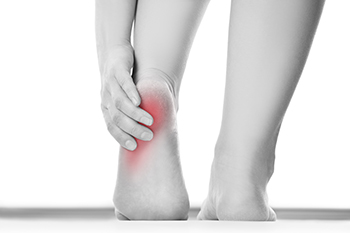
It is undeniable that wearing certain kinds of shoes can negatively impact the health of the feet. For example, flip-flops and high heels are just two kinds of shoes that can potentially harm the health of the feet. Flat shoes with little to no support or cushioning can also cause pain in the feet, especially the heels. There are many reasons for this phenomenon. Most importantly, when an individual walks with flat shoes, the heel bone takes the brunt of the force. Therefore, flat shoes may exacerbate heel pain. One can mitigate heel pain and prevent it by wearing supportive shoes instead of completely flat shoes. If you are someone currently struggling with heel pain, it is suggested that you contact a podiatrist today for treatment and advice.
Many people suffer from bouts of heel pain. For more information, contact Dr. Howard Horowitz of Bowie Foot & Ankle . Our doctor can provide the care you need to keep you pain-free and on your feet.
Causes of Heel Pain
Heel pain is often associated with plantar fasciitis. The plantar fascia is a band of tissues that extends along the bottom of the foot. A rip or tear in this ligament can cause inflammation of the tissue.
Achilles tendonitis is another cause of heel pain. Inflammation of the Achilles tendon will cause pain from fractures and muscle tearing. Lack of flexibility is also another symptom.
Heel spurs are another cause of pain. When the tissues of the plantar fascia undergo a great deal of stress, it can lead to ligament separation from the heel bone, causing heel spurs.
Why Might Heel Pain Occur?
- Wearing ill-fitting shoes
- Wearing non-supportive shoes
- Weight change
- Excessive running
Treatments
Heel pain should be treated as soon as possible for immediate results. Keeping your feet in a stress-free environment will help. If you suffer from Achilles tendonitis or plantar fasciitis, applying ice will reduce the swelling. Stretching before an exercise like running will help the muscles. Using all these tips will help make heel pain a condition of the past.
If you have any questions please contact our office located in Bowie, MD . We offer the newest diagnostic and treatment technologies for all your foot and ankle needs.

